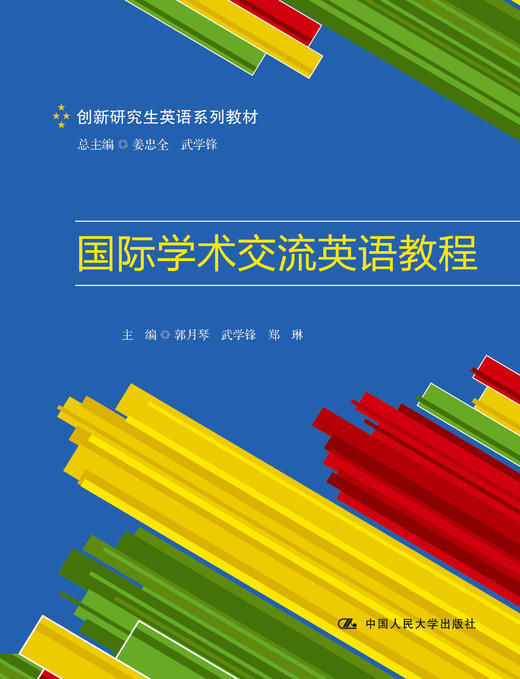商品详情


教材内容注重培养研究生的学术英语交流能力、综合语言运用能力和国际视野,包括各种专题的探讨与研究,如石油能源类、工程类、哲学人文社科类、理科类等。具体可分为石油工程、石油地质、石油储运、石油化工、文史类、哲学类、理学类等。将国际学术交流的各个环节按照特点分插到各个主题,旨在培养学生专业英语能力的同时,注重学生国际视野的培养,增强国际学术交流能力。

郭月琴,女,山东省聊城市人,1995年7月毕业于聊城师范学院英语教育专业,获学士学位;2007年7月毕业于中国石油大学英语语言文学专业,获文学硕士学位;2000年12月晋升为讲师,2006年12月晋升为副教授,2013年12月晋升为教授;2007年遴选为硕士研究生指导教师。现任研究生外语教学部主任。先后获得中国石油大学(华东)“优秀教师”、中国石油大学(华东)“劳动模范”、中国石油大学(华东)第二届“良师益友-研究生心目中的好导师”等荣誉称号。主持参与多个项目,发表论文多篇。

Part One Academic Writing
Unit 1 Thesis Title
Unit 2 Abstract
Unit 3 Introduction
Unit 4 Method
Unit 5 Results and Discussion
Unit 6 Conclusion
Unit 7 Bibliography
Part Two International Conference
Unit 8 Conference Notice
Unit 9 Conference Invitation Letter and Reply
Unit 10 Conference Program
Unit 11 Giving a Welcome Speech
Unit 12 Introducing a Speake
Unit 13 Oral Presentation at an Academic Conference1
Unit 14 Question and Answer Session
Unit 15 Giving a Closing Speech
Part Three Guide of Studying Abroad
Unit 16 Important English Tests: TOEFL, IELTS, GRE
Unit 17 Application Documents for Studying Abroad
Unit 18 Visa Application
Appendices
Appendix I Calling for Papers
Appendix II Core Concepts of Chinese
Appendix III Travel Guide in Qingdao

Part One Academic Writing
The term academic writing comprises many different types of text, ranging from a research article written for publication in an academic journal to a MSc dissertation to an essay written for a university course.
However, there are certain features which appear to be typical of academic writing. For example, academic texts answer a specific question, or questions, using a set of well-structured, logical arguments. The arguments are often based on research carried out by the writer or other researchers. Academic texts contain references to previous research, which are documented at the end of the text. Academic texts are written in an impersonal, objective style, and are characterized by certain language features such as the avoidance of personal and contracted forms, a high lexical density, frequent nominalisations and the use of the passive.
Unit 1 Thesis Title
A title is the name of a thesis, which can convey the theme and the main idea of the thesis.
As the saying goes, a good beginning is half of success. A good title will probably lead to a successful thesis likewise. With an appropriate title, the thesis you write can draw the most attention of the readers within the shortest time. That is to say, it is of great importance to make a good title for your thesis. The title, which can reflect the academic sensitivity of the student, is the soul of the thesis, and can give an accurate description of the thesis by using concise language.
It is not an easy job to make a good title, though there are only a few words in it. You have to have a very clear knowledge of what you’ve written in your thesis and what exactly you want to express by your thesis. In addition, it is necessary to improve your application of language so as to make a satisfactory title.
Before we get to an in-depth study of it, do the following practice and see how much you know about the choice of the title.
I. Brainstorming
1. Look at the following titles and choose an appropriate one.
Development of Petroleum Geology in China
Petroleum Geology
Petroleum geology features and research developments of hydrocarbon accumulation in deep petroliferous basins
2. Compare the following titles and choose a better one.
Restricting carbohydrates to fight head and neck cancer—is this realistic?
A new research on restricting carbohydrates
3. Look at the good titles below and analyze them.
English idioms—A mirror reflecting British culture
Structural features and petroleum geology of the fold-thrust belt in the southern Tarim basin, China
II. Relevant Information
The best title is to use the least words to give an accurate description of the thesis. How can we choose a good title for the thesis?
1. Getting a clear knowledge of the thesis
The title should express the main idea of the thesis, which means that the readers can get the information of what you have written or what you want to express in the whole thesis. To achieve that, you should know clearly about what you have written, and summarize it in accurate words.
2. Improving the ability of using words
A good title can quickly draw others’ attention, which asks for your good capacity of using words. To improve that kind of ability, you should pay attention to rhetorical devices in daily life and try to use figures of speech to write with your own words.
- 人民大学出版社微店 (微信公众号认证)
- 人大出版社自营微店,正版人大出版社书籍直发,品质保证!
- 扫描二维码,访问我们的微信店铺
- 随时随地的购物、客服咨询、查询订单和物流...



![[签名版+21天读书会+父母践行手册( 1-7版)]脱瘾而出:如何让孩子放下手机](https://img01.yzcdn.cn/upload_files/2024/12/06/FkH4-HdemAWRoGCkNArA8dJyRSRb.jpg?imageView2/2/w/260/h/260/q/75/format/jpg)






